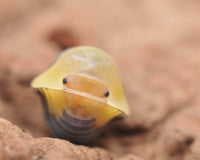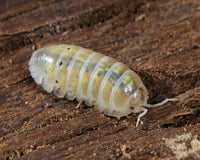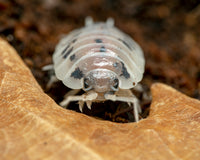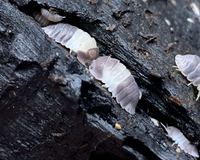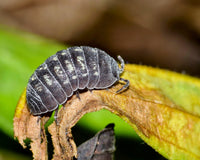What makes Rubber Ducky Isopods stand out from our competition? The simple answer... We Don't Use DIRT! We focus on building our living soil mediums by hand, allowing our microbes six months of inoculation before adding our exotic and rare isopod breeding stocks. Part of our "secret sauce" is understanding the Soil Foodweb and improving on Mother Nature by building bio-film in our living soil composting & vermicomposting systems.
Have you ever heard of composting and vermicomposting? Lately, more and more isopod farmers learn about the full spectrum of benefits of using compost, vermicompost, and worm castings. Some beginning Isopod farmers probably do not fully understand this fascinating and beneficial regenerative method. Truth is, many Isopod farmers do not give composting a second thought because they have heard misinformation that composting is "inconvenient," "smelly," and "messy." When done correctly, this is simply untrue.
Four Composting Worms Your Isopods Love

African Nightcrawlers: (Eudrilus eugeniae)
Preferred Burrow Depth: 6" to 8" These highly active composting worms are the perfect hybrid of attributes between the Red Wiggler composting worm and the European Nightcrawler. Much more extensive than the Red Wigglers and more versatile and sleeker than the European Nightcrawler, the African Nightcrawler is our favorite composting worm to use in conjunction with our Cubaris sp (Tropical) isopods.
Alabama/Georgia Jumper: (Amynthus gracilus)
Preferred Burrow Depth: 6" to 8" The reason this composting worm became known as a "jumper" is due to its incredible ability to rock itself back and forth so quickly and violently that it can jump right out of your hand! Known for digging deeper oxygen channels within your soil systems, the Alabama/Georgia Jumper is excellent at breaking down and breaking through compacted soils.
European Nightcrawler: (Eisenia hortensis)
Preferred Burrow Depth: 3" to 8" The European Nightcrawler has become somewhat famous for being the "big brother' composting worm to the Red Wiggler. Keeping roughly the same soil depth profile as the African Nightcrawler, this enormous composting worm consumes more considerable amounts of decaying matter and builds larger dissolved oxygen channels.
Red Wigglers: (Eisenia foetida)
Preferred Burrow Depth: 2" to 4" By far, the most recognized and popular composting worm, these hardy and robust composting worms consume just about anything you feed them. In addition to their sizeable appetites, their preference to destroy and break down organic material found at the "soil floor" level of our bioactive enclosures provides the perfect balance. Red wigglers are THE choice for beginner isopod farmers who want to start working with both species to improve their bioactive vivariums and terrariums' overall health.
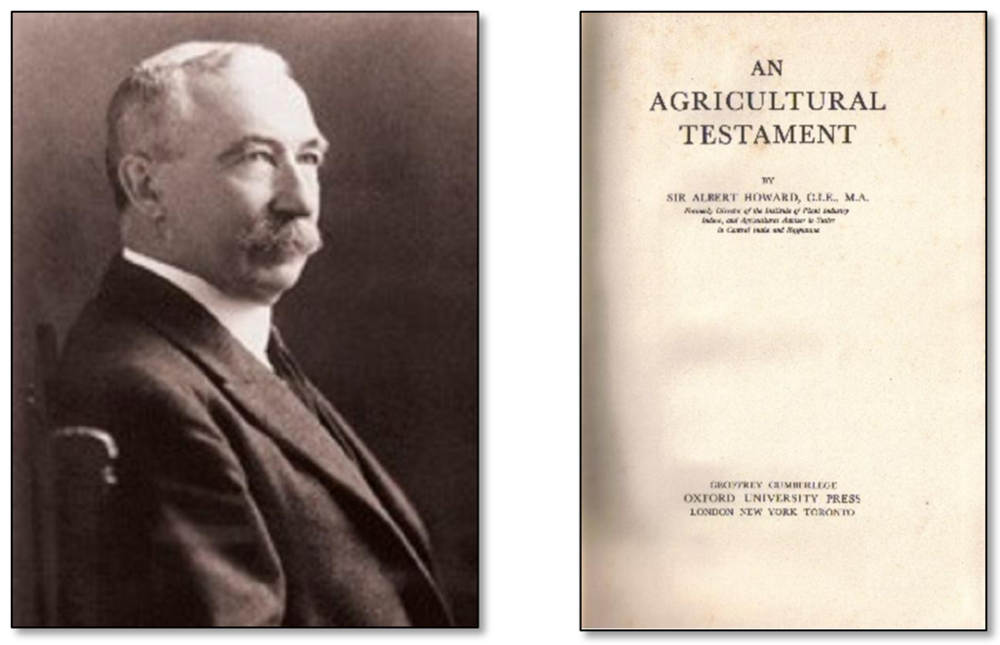
Basic composting has been the beginning blueprint and foundation of organic living soil gardening since Sir Albert Howard, father of the beginning traditional American organic method. Between 1905 and 1934, he founded the Indore method of compost making. This composting style uses materials set and layered on top of one another (Lasagna method) and then Vermicomposted during the decomposition process.
While staying focused on building a living soil medium, composting teaches new ways and proves a beneficial way to reuse raw materials that would otherwise end up in the garbage, not becoming nutrition for your isopods.
With today's article, we will teach you that composting for isopods does not take up a lot of time, as long as you stay pro-active instead of re-active. These simple soil building concepts can be quite beneficial to your isopods in a variety of ways.
Understanding Composting Basics For Isopods
 To fully appreciate composting for isopods, you must understand the pros and cons of composting overall soil medium health. Composting, especially vermicomposting, is not a method to recycle everything you have in your home. You cannot compost just anything... in fact, to get its full benefits, you have to know what you can and cannot compost.
To fully appreciate composting for isopods, you must understand the pros and cons of composting overall soil medium health. Composting, especially vermicomposting, is not a method to recycle everything you have in your home. You cannot compost just anything... in fact, to get its full benefits, you have to know what you can and cannot compost.
Brown Manure Isopod Foods:
- Dry Leaves (Pesticide Free)
- Wood Chips
- Shredded Paper
- Sawdust & Wood Shavings
- Paper Towel & Toilet Paper Roll Tubes
- Organic Straw & Timothy Hay
- Plain Brown Cardboard
Green Manure Isopod Foods:
- Vegetable Scraps
- Coffee Grounds & Filter Paper
- Organic Teabags
- Disease Free Feathers
- Organic Eggshells
- Pesticide Free Plant Manure
- Chickweed
Composting is not difficult at all. Yes, like anything else you learn for the first time, composting does take some time and practice to do very well. That is why we suggest learning more about vermicomposting, as it takes away the human error element to the composting process.
Vermicomposting does not even take up a lot of space; the composting worms hate the light and can easily be kept under the stairs in your basement, and you will still accomplish a healthy inoculation. Some people choose to have large Vermicomposting bins on site, but you do not have to do this to succeed at composting.
Last of all, vermicomposting is not expensive. If you choose to start, there will be higher initial costs than composting of getting all of your raw composting materials and strategic composting worm counts based on your worms' space and size enclosures. Still, after that, your vermicomposting fabric pots will become maintenance-free in a short few months if you learn how to feed your worms strategically.
Defining Isopod Vermicomposting Basics

By definition, vermicompost is simply the end product of decomposed food scraps and organic matter that has gone through the gizzard and through a composting worm's digestion tract. This may include the following type of organic matter examples such as organic kitchen scraps, organic garden plant material, pesticide-free leaves, cold manures, sawdust, and organic timothy hay (also great to feed your Lionhead Rabbits).
With the proper microbial balance, composting happens naturally, and you can harness this natural breakdown cycle and use it to your advantage to replicate the old-growth forest floor.
Food scraps and green plant material that is considered organic will break down without needing the aid of an expensive compost bin. All it takes is time and patience. When you compost in your basement or in your backyard, you improve on the Mother Nature system and speed up this process.
Isopods & Springtails

White Springtails Infographic Created By: Sarah Wilson
We are focused on using healthy compost to inoculate all of our isopod soil-dwelling mediums so that they work in a symbiotic relationship with our composting worms & white springtail mites. What you do with the end results is up to you, but many people choose to use their compost for their gardens.
White Springtail Mites: (Collembola)
Preferred Burrow Depth: .5" to 3" With just some basic research, you could easily overlook the importance of springtails and how pivotal a role they play in conjunction with your isopod colonies. White Springtail Mites prefer to break down animal feces, decaying or softened wood and plant matter, as well as protein and vegetable sources. An almost identical diet to your isopods and the best part of using mother nature to improve mother nature is that your isopods and springtails will work within a symbiotic relationship to feed and nourish one another!
While vermicompost is not that high in essential nutrients, it is considered a soil conditioning inoculate. When thinking of conventional N-P-K ideology, you can see that it is not utilized as a fertilizer. Microbes are meant to innoculate and improve basic dirt systems, and we begin to see full inoculation starting at three weeks.
Now that you learned a little more about composting and vermicomposting, it is time to dive deeper into this beautiful process of recycling to reuse.
Click Here to read the next chapter on Composting & Vermicomposting for Isopod Health.








